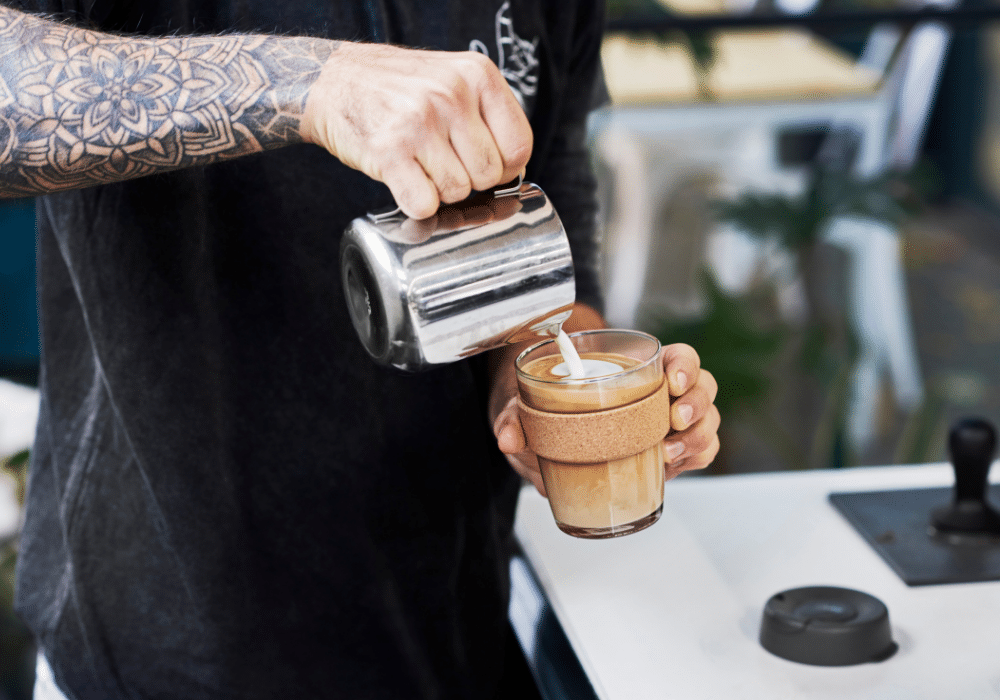Beyond KeepCups: the Latest Sustainable Takeaway Coffee Cup Solutions
Mar 19, 2021
“Having 20 KeepCups in your drawer is probably worse than using a takeaway cup every day. There’s the facade of doing the right thing,but you have to use it multiple times for it to actually be sustainable.”
Drinking coffee is fraught with decisions. Will it be caffe latte, flat white, maybe long macchiato? Is it cow milk, almond, oat or soy? But wait there are more decisions! Is it in a KeepCup, eco-cup or an upcycled jar, or will it be one of the billion or so paper-and-plastic cups that end up in landfill in Australia every year?
Consumers are increasingly concerned about sustainability, but they often expect the businesses they buy from to offer them solutions, hopefully at no extra cost. “As cafes, we are expected to be providing eco-friendly cups, but they are at least 30 per cent more expensive than traditional packaging,” says Haley Aldred of El Gordo cafe in Bendigo, Victoria. She has asked local government to look into subsidies to share the load but has not yet had success.
Sustainable coffee cup solutions
Eco-friendlier options include compostable ‘I Am Not Paper’ cups, made from plant pulp and printed with biodegradable inks. At $100 for 1,000 cups, they’re almost double the price of single-wall disposable coffee cups.
Feedback from customers is positive, says Mark Johnstone from Lilo Cafe in Mornington, Victoria. “The cups hold up exceptionally well with hot drinks, considering what they are made of,” he says. “People are happy that they are better for the environment, though a few don’t like the ‘mouthfeel’ of the lid.”
Coming soon to the Australian market, Good-Edi cups are made from oat bran, wheat flour and a little sugar. They’re designed to hold their structure for hot drinks but can be eaten after the last sip, tasting a little like a waffle cone. The grain-based material acts as an insulator and is made using vegan components; the cups are designed to break down in compost within two weeks –if not eaten first.
Padre Coffee is a roastery that also runs six cafes in Noosa and Melbourne. Bessie Marks is the community impact and engagement manager for the company,with a major focus on sustainability. She’s a fan of KeepCups but also notes that they can be problematic. “The number one thing is that people have to use them,” she says. “Having 20 KeepCups in your drawer is probably worse than using a takeaway cup every day. There’s the facade of doing the right thing,but you have to use it multiple times for it to actually be sustainable.”
When customers do bring KeepCups or similar reusable cups, the impact for a cafe and the environment can be significant. KeepCup’s Impact Calculator allows businesses and individuals to gauge the difference their actions make. If a cafe serves 100 coffees a week in reusable cups rather than disposables, they will save 27.56kg of carbon dioxide emissions per year and $1,040 in annual cup purchases.
Another reusable bit of coffee kit is Stay Tray, a sturdy drinks holder made from recycled plastic. A basic four-cup tray is $25,but again, it relies on consumers remembering to bring it along.
The sustainable way forward
Returnable cup programs are starting to pop up around Australia. Cup Exchange is an informal network that started in Albany, Western Australia, and encourages consumers to donate old cups and mugs, use them for takeaway and then return them to any participating cafe.
Darebin Council in Melbourne’s inner-north has launched a similar, more formal scheme called Wangim. The name is the local Woiwurrung word for “boomerang” and has been used with permission from Wurundjeri Woiwurrung Cultural Consultants. So far, seven local cafes have come on board – cups can be used for no extra charge, then returned to any participating location where they are washed and stored according to council-designated COVID-safe practices.
“I think systems like that are the way of the future,” says Padre’s Bessie Marks. “At the moment, the onus is often on very small businesses that are struggling to make a profit, let alone think bigger picture. We need more support from bigger corporations and governments to encourage positive actions and assist with things like waste management.
“At the moment, it often ends up being additional costs for cafe owners who are pressed to make decisions that may not align with their aspirations towards sustainability.”
To keep up to date with food industry news and Fine Food Australia updates, subscribe here.
Most Read
You may also like
-
Stay up to date with the latest news, industry insights and Fine Food Australia updates.
- Subscribe









